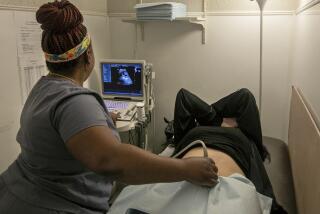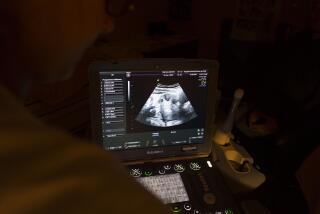Blood Tests Favored Over Amniocentesis : Medicine: Study of pregnant women over 35 suggests that alternative screening for Downâs syndrome is safer. It could save $250 million a year.
A new study of pregnant women over age 35 suggests that simple blood tests are safer than amniocentesis, a test widely used to screen fetuses for Downâs syndrome, and could save $250 million a year in medical costs.
A research team from the Foundation for Blood Research in Scarborough, Maine, and the California Public Health Foundation in Berkeley has reported that screening based on the blood tests diagnosed 89% of Downâs cases in mothers over age 35, compared with almost 100% caught by amniocentesis. Nationally, this means that women screened with blood tests would bear an additional 320 Downâs syndrome babies each year, according to an editorial accompanying the study in Thursdayâs New England Journal of Medicine.
But the study also indicates that 14,000 amniocentesis-linked miscarriages of healthy fetuses might be avoided by using the blood tests, the editorial noted, and up to $250 million might be saved annually.
Those estimates assume that the blood tests would be given first, with amniocentesis given later to women shown to have at least a 1 in 200 chance of having a Downâs syndrome baby. About 25% of the over-35 women given blood tests would fall into that risk category and would need the second test, the researchers said.
Amniocentesis is routinely recommended for pregnant women over 35 because the risk of having a Downâs syndrome baby rises with the motherâs age. The overall risk is one in 700, but it rises to one in 270 for mothers at age 35 and one in 40 for women at age 40.
In amniocentesis, a needle is inserted through the womanâs abdomen to withdraw amniotic fluid containing fetal cells from the uterus. Analysis of fetal chromosomes can detect fetuses that inherit an extra copy of chromosome 21, causing retarded mental and physical development.
An alternative is a technique called chorionic villus sampling, in which a catheter is inserted to gather cells from the placenta. Both sampling procedures carry a small risk of causing miscarriage.
In the past 10 years, new tests based on blood sampling to measure three substances--alpha-fetoprotein, human chorionic gonadotropin and unconjugated estriol--have come into use for identifying fetal Downâs syndrome. The blood tests are not believed to create any risk of miscarriage.
The safety of blood testing, plus the expense of amniocentesis, âmade a compelling case that biochemical screening might prove useful for women 35 years of age or older,â said Dr. James Haddow of the Foundation for Blood Research.
The average cost of counseling, amniocentesis and chromosome-counting is about $1,000 in the United States. In contrast, the blood tests cost about $75.






